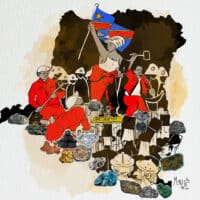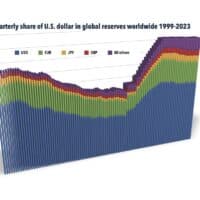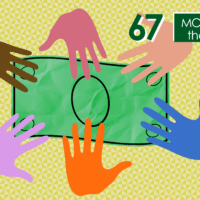-
On The Rewriting of History
[Britannica’s revisionist] distortions of the history of the Vietnamese struggle are just as radical and just as misleading [as those about the Soviet Union]. Here we may draw some valuable lessons about the hidden content of form: how apparently neutral principles of organization may shape meaning.
-
Dossier no. 77: The Congolese Fight for Their Own Wealth
The DRC’s vast mineral wealth contrasts with its extreme poverty, caused by exploitation and conflict. The dossier emphasises sovereignty and dignity, echoing Congolese activists’ visions for freedom.
-
What is the realistic strategy for “de-dollarisation”?
As there can only be one price standard in any functioning economic system the transition from one price standard to another cannot take place gradually, or in a mixed way, but must take place sharply, and therefore completely in a very short time frame.
-
Germany and Netanyahu: Berlin Bulletin No. 223, June 7, 2024
Far from water-logged Bavaria, immensely worse destruction is bloodily wrecking two million lives, and with Germany, though so distant, deeply involved. Of course I mean Palestine, especially Gaza. For decades the media has distorted or ignored what has been happening there. After October 7th ignoring it was no longer possible, here or anywhere.
-
The Black University Concept with Andrew J. Douglas
Andrew J. Douglas, political theorist and professor of political science at Morehouse College, joins Money on the Left to discuss his latest article, “Modern Money and the Black University Concept,” published April 19, 2024, in Money on the Left: History, Theory, Practice.
-
Britain’s century long Opium trafficking and China’s ‘Century of Humiliation’ (1839-1949)
In 1500, India and China were the world’s most advanced civilizations.
-
Whether Bird Flu Is on the March Misses the Point
The New England Journal of Medicine reported the case of a Texan farmworker infected with HPAI H5N1. He suffered the hemorrhaging in the eye the cows he tended expressed.
-
Dossier No. 76: The New Cold War is sending tremors through Northeast Asia
This dossier looks at how the U.S.-led New Cold War against China is destabilizing Northeast Asia, focusing on the Korean Peninsula, Taiwan Strait, and Japan.
-
Letters of protest: Colleges suppress dissent while closing their eyes to genocide, extended version
As a former college teacher, one who witnessed the attacks on those who protested against the War in Vietnam and who studied the repression on campuses during the McCarthy period, I became so appalled at what was being done to our brave and courageous college students that I began to write letters to the leaders of what are, in reality, academic enterprises.
-
U.S. dooms itself to defeat in peaceful competition with China
Superficially in the recent period the U.S. has attempted to display two apparently contradictory sides of its policy to China.
-
Aesthetics after Autonomy with Grant Kester
Money on the Left is joined by Grant Kester, professor of Art History at University of California, San Diego. We speak with Kester about his multi-decade career, researching and teaching the history of socially engaged art.
-
Humboldt and Gaza: Berlin Bulletin No. 222, May 4, 2024
It was May 10th in Germany’s terrible year 1933, Hitler had been in power for hardly three months, when students and staff emptied the university libraries of forbidden books and threw them, an estimated 20,000 books by over a hundred authors, into the flames of a giant bonfire.… No books were burned this time in early May. But there were ironic parallels, some all too alarming!
-
Portugal: Fifty Years Since the Carnation Revolution
John Green on the fiftieth anniversary of Portugal’s Carnation Revolution.
-
Gramsci and his friend “S”
Piero and Nino exchanged ideas, criticized one another, encouraged each other; Nino often used Piero, seven-years his junior, as an intellectual sounding board, as a trusted interlocutor, asking for advice, for suggestions, whether his friend could chase up a source, a book or journal, a magazine or newspaper article, could he confirm this fact and that, find out some precise detail about Croce’s historical studies, if Machiavelli ever wrote anything about economics, or David Ricardo about philosophy.
-
From Harvard to Karl-Marx-Allee: The Experiences and Reflections of an American Communist in East Germany
In this interview with Zhao Dingqi, Victor Grossman reflects on his life as an American communist in East Germany.
-
So-Called “Peak China” Is Simply a Western Campaign for China to Commit Economic Suicide
Despite the fact that China’s economy continues to far outgrow all major Western economies the Western media is energetically promoting a myth that China’s economy either has or is about to drastically slow down.
-
Dossier No. 75: The Political Organisation of Brazil’s Landless Workers’ Movement (MST)
This dossier focuses on the MST’s tactics and forms of organisation and why it is the only peasant social movement in Brazil’s history that has managed to survive for over a decade in the face of the political, economic, and military power of Brazil’s large landowners.
-
The GI Life in “The One We Had to Win”
Veteran Cleveland writer and photographer Scott MacGregor recovered a manuscript written by his uncle Hugh O’Neill, which turned into Captured! A World War II Memoir. In it, O’Neill weaves a real-life tale of his life as a prisoner of the Germans in the last year of the Second World War and Cleveland comic artist Gary Dumm, who has worked with the best of the genre, Harvey Pekar in particular, provides vivid illustrations.
-
Neurodiversity and Justice: Embracing Neurodiversity as Part of the Fight Against Discrimination and Injustice
It is time to position ourselves at the pivotal intersection where the celebration of neurodiversity meets the call for social justice.
-
Economic Democracy with Pavlina Tcherneva
Money on the Left speaks with Pavlina Tcherneva, Professor of Economics at Bard College and leading scholar of–-and advocate for—Modern Monetary Theory (MMT). Many of our listeners will be familiar with Dr. Tcherneva’s contributions to MMT, especially her book, The Case for a Job Guarantee (Polity Press, 2020). We speak with Pavlina about her work, and also get her perspective on the causes and conditions of MMT’s movement from the margins of economic discourse toward the mainstream of political economic thought.



















